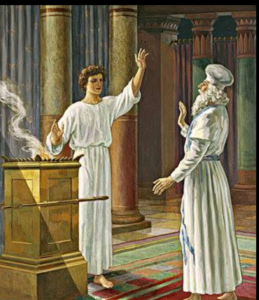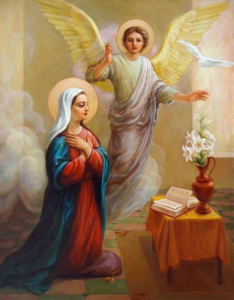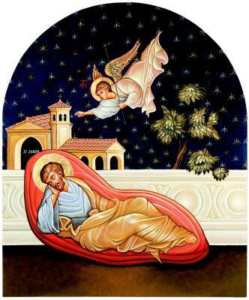The Liturgical Year – First Season I Season of Annunciation – Season of Advent

Church calendar begins with Koodosh Eetho (Church New Year), Koodosh means to consecrate or sanctify. This is followed by Hoodosh Eetho, Hoodosh means to clean, purify and dedicate. Eetho means Church. The concept is to, first SANCTIFY and then DEDICATE the Church. Church does not mean the building but encompasses all the faithful. During this season of Koodosh Eetho to Christmas, the emphasis is on God’s eternal covenant, renewal and sanctification of humanity.
Church follows a pattern; reads scriptures, remembers, celebrates and completes the principal events of our Lord’s redemptive activities in a year- cycle so that the faithful constantly grow in Him, Eph 4:15. Sanctification imports variety of meanings such as clean, holy, set apart and dedicate for service of God, etc. The faithful of the Church as whole is to purify themselves and seek forgiveness of sins from God and brethren.
The first liturgical season of our Liturgical Year is from Koodosh Eetho till Yeldho
Koodosh Eetho (Sanctification Sunday)
Hoodosh Eetho (Dedication Sunday)
Annunciation to Priest Zachariah
Annunciation to Virgin Mary
Visitation of Mary to Elizabeth
Birth of John the Baptist
Revelation to Joseph
Sunday before Christmas
Yeldho (Christmas) December 25th

The first five Sundays are aptly called Sundays of Annunciation. Annunciation to Zachariah (Lk. 1: 1-25), Annunciation to Mary Lk. (1: 26-38), Visitation of Mary to Elizabeth (Lk. 1: 39-56), Birth of John the Baptist (Lk. 1: 57 – 80), Revelation to Joseph (Mt. 1: 18-25). This is followed by the Sunday before Christmas when we remember the whole generation of mankind beginning from Adam (Mt. 1: 1-17). Finally this season culminates in (Yeldho – Birth of Christ) Christmas the Nativity of our Lord on 25th December (Mt. 2: 1- 12). One has to undertake the Fast of Advent, in order to prepare one’s body and spirit in perfect hygiene, undefiled heart and go in time to meet and receive the awesome God of Universe, Lord of Lords and King or Kings, Christ Jesus.

Season of Annunciation – Season of Advent
The word Advent is from the Latin ‘Adventus,’ which means ‘coming’ or ‘arrival’; Parousia is a Greek word found in the ancient text of our Holy Scriptures which, represents an imminent return. Like Lent, Advent is a preparatory season.
In the Orthodox Tradition, Advent is a period of fasting and preparation in connection with the Feast of the Nativity of our Lord. So, Advent is the time of the year when we look forward to the arrival of Jesus and is best understood as a period of preparation for the commemoration of Christ’s entry into our world as an event in salvation history. The focus of the entire season is the birth of Jesus the Christ in his First Advent, and the anticipation of the return of Christ the King in his Second Advent. Advent originally had its meaning, when the early Christians looked forward to the Second Coming of Jesus as promised. Many thought that it was going to happen during their lifetime. Later, this practice of ‘looking forward’ to the coming of Jesus Christ was combined with the ‘looking back’ to the first arrival (Incarnation) of Jesus Christ on Christmas Day. It has significance because it is a season of looking forward and waiting for something greater; both for the annual celebration of the event of Christ’s birth, and for the time when Christ will come again.

Western churches celebrate 4 Sundays prior to Christmas as the Advent Season. However in Syriac Orthodox tradition, we have an extended advent season. We look back on the events of the first Christmas from Hoodosh E’tho to Christmas. The emphasis is on birth of Christ, the God’s eternal covenant, renewal and sanctification of humanity or rebirth of the faithful. We prepare for God’s coming among us. During the Advent, the faithful are asked: to prepare themselves worthily to celebrate the anniversary of the Lord’s coming into the world as the incarnate God of love, thus to make their souls fitting abodes for the Redeemer coming in Holy Communion and through grace, and thereby to make themselves ready for His final coming as judge, at death and at the end of the world. It is a reminder that we were made for God; that He loved us enough to enter into our existence. It is a time to ponder which world we wish to be permanent citizens in… this flawed but beautiful and passing one or the eternal world to come. So, let’s also pause to consider what Advent was intended to be… a time to contemplate the love of our God Who entered into our history to save us.
0 Comments